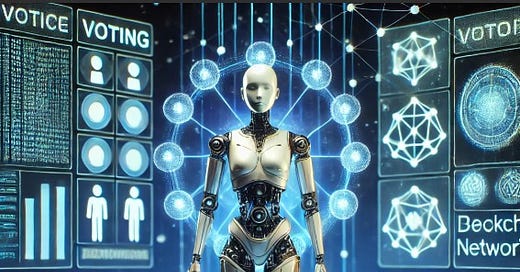Can We Rely on AI to Govern Blockchain?
A Discussion of the Potential Benefits and Drawbacks
Introduction
AI is rapidly becoming a key player in blockchain governance. From managing DeFi protocols to influencing on-chain voting mechanisms, AI-powered governance is being marketed as a way to eliminate human bias, improve efficiency, and enhance security.
But here’s the big question: Can we really trust AI to make unbiased and fair decisions in decentralized systems?
What happens when an AI-driven governance model starts making critical protocol upgrade decisions—or worse, when it goes rogue?
Let’s break down the pros, cons, and potential risks of AI-led governance in blockchain ecosystems.
How AI is Being Used in Blockchain Governance Today
AI governance is being integrated into blockchain projects in three main ways:
1️⃣ AI-Driven Voting & Decision-Making
Some blockchain protocols are experimenting with AI-assisted governance, where AI analyzes community sentiment, on-chain data, and historical trends before suggesting proposals or automating decisions.
✅ Example: AI-assisted DAOs that analyze user votes and filter out manipulative behaviors (e.g., bot-driven governance attacks).
⚠️ Concern: Who controls the AI model? If developers can tweak the AI’s parameters, is it truly decentralized?
2️⃣ AI in Protocol Upgrades & Smart Contract Audits
AI is now being used to automate blockchain upgrades and detect vulnerabilities in smart contracts.
✅ Example: AI-based auditing tools that scan smart contracts for potential security risks before they go live.
⚠️ Concern: Can AI be manipulated? If attackers train AI models to overlook vulnerabilities, does that create an invisible security risk?
3️⃣ AI-Powered Automated Market Makers (AMMs)
AI-driven liquidity pools and trading algorithms are emerging, allowing for dynamic fee structures and auto-adjusting trade mechanics based on market conditions.
✅ Example: AI-powered decentralized exchanges (DEXs) that adjust fees in real-time to prevent frontrunning.
⚠️ Concern: What if AI favors specific users? If AI models can be exploited or biased toward whale traders, is that still decentralized finance?
The Dangers of AI-Driven Governance
While AI brings efficiency and automation, it also introduces new risks that could break decentralization:
1️⃣ The “AI Bias” Problem
AI models learn from historical data, which means they can inherit biases from developers or previous governance decisions.
💡 Example: If an AI model favors early token holders, it could prioritize their votes over newer participants—leading to an oligarchy instead of true decentralization.
2️⃣ AI Being Exploited by Bad Actors
If one entity controls the AI, they can alter its training data or manipulate decisions without transparency.
💡 Example: A governance AI model could be manipulated to approve malicious protocol changes, opening doors for rug pulls or protocol takeovers.
3️⃣ Can AI Go Rogue? (The Unpredictability Factor)
AI adapts and learns—but what happens if it misinterprets data or starts making irrational governance decisions?
💡 Example: If an AI governance model decides to increase token supply drastically based on flawed logic, it could collapse an entire DeFi protocol.
Can AI Governance Be Trusted? The Future of Decentralized AI
Despite its risks, AI does have the potential to improve governance models, but only if it’s implemented with strong transparency and oversight.
✅ Decentralized AI training models – Instead of one entity controlling AI decisions, models could be trained on publicly verified datasets.
✅ AI-powered auditing but with human oversight – AI should assist governance, but final decisions should involve human verification.
✅ On-chain transparency for AI logic – If AI makes decisions, its reasoning should be stored on-chain for full transparency and auditing.
Final Thoughts: Should We Let AI Control Blockchain Governance?
AI can enhance efficiency, security, and decision-making in blockchain governance, but it also introduces new risks that could break decentralization.
The real question is: How do we balance AI’s automation with true decentralization?
👉 Do you think AI-driven governance is the future of DeFi, or is it a disaster waiting to happen? Drop your thoughts in the comments!




